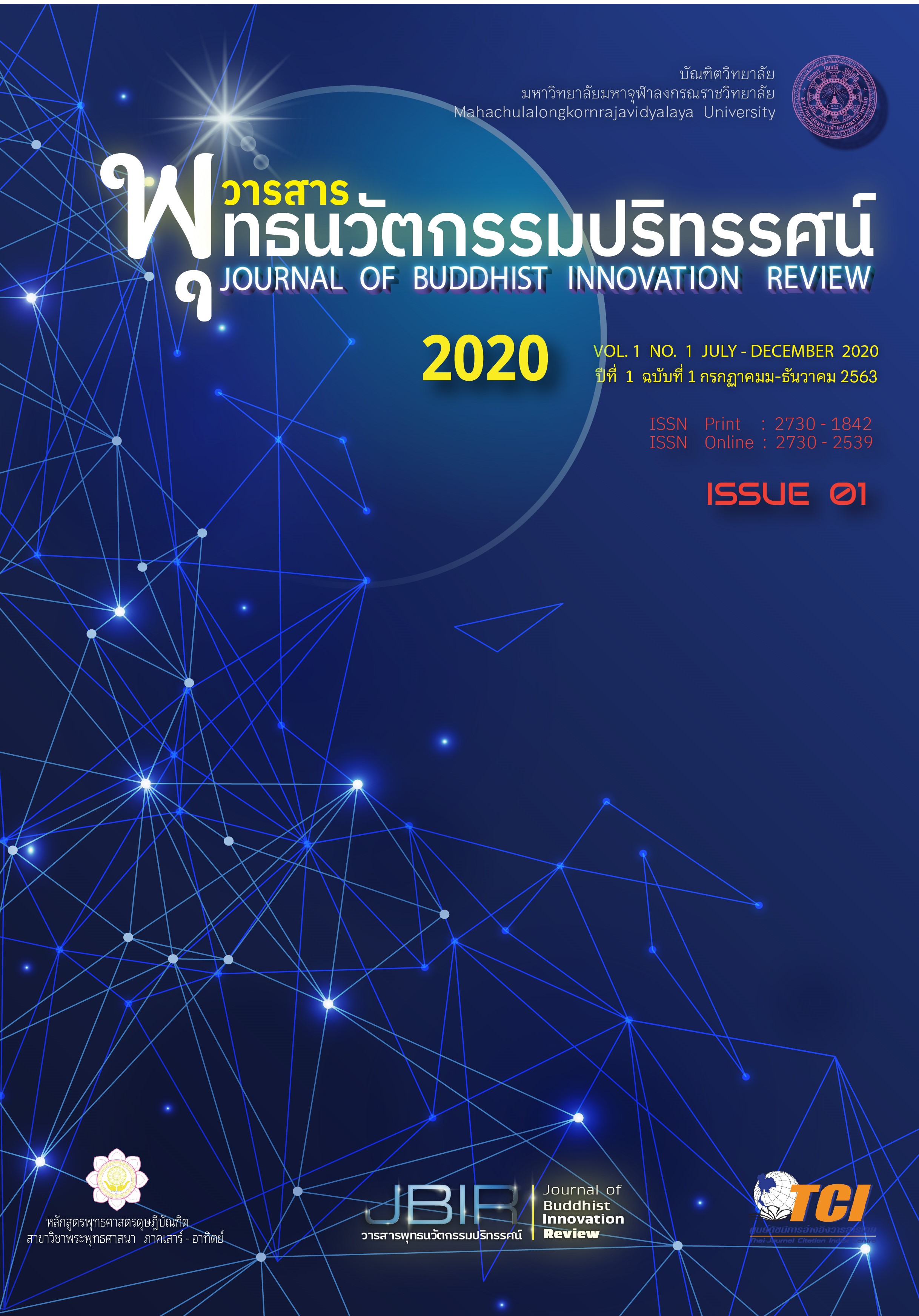แนวทางการป้องกันโรคโควิด-๑๙ ตามหลักสังวรในพระพุทธศาสนา
Main Article Content
บทคัดย่อ
บทคัดย่อ
ไวรัสโคโรนาสายพันธุ์ใหม่มีการแพร่เชื้อจากสัตว์สู่มนุษย์และจากมนุษย์สู่มนุษย์ด้วยกัน ขยายไปสู่ประชาคมโลกอย่างรวดเร็วภายในเวลา ๑ เดือน สามารถติดต่อทางลมหายใจและการสัมผัสกัน โดยผู้ติดเชื้อไม่แสดงอาการ ผู้ป่วยที่เสียชีวิตส่วนมากอยู่ในวัยชราและมีโรคแทรกซ้อน องค์การอนามัยโลกประกาศว่าเป็นโรคระบาดที่ร้ายแรง ที่ทุกประเทศต้องปัองกันอย่างรีบด่วน มีผู้เสียชีวิตมากกว่าหนึ่งแสนคน ติดเชื้อสะสมมากกว่าสองล้านคน(นับถึงวันที่ ๑๖ เมษายน ๒๕๖๓) และยังไม่มีวัคซีนรักษา มาตรการในการป้องกันหลัก คือการเว้นระยะห่างทางสังคมที่เรียกว่า social distancing และต้องสวมหน้ากากอนามัยเพื่อป้องกันตนเองและสังคม สังวรคือหลักการสำรวมระวัง ๕ อย่าง คือปาติโมกขสังวร สติสังวร ญาณสังวร ขันติสังวรและวิริยสังวร เป็นหลักธรรมในการประพฤติปฏิบัติของพุทธบริษัท มุ่งพัฒนากายวาจาและจิตสู่ความพ้นทุกข์ มีเนื้อหาสำคัญคือการสำรวมระวัง โดยมีสติและปัญญาทำหน้าที่ประสานสอดคล้องกันอย่างเหมาะสม มีขันติและวิริยะสนับสนุนให้การปฏิบัติทางกาย วาจาและจิตเข้มแข็ง มีปัญญาไตร่ตรองตามกรอบอริยสัจ ๔ หลักธรรมที่เป็นเอกในสังวร ๕ คือสติและปัญญา สติและปัญญาช่วยกำกับและพิจารณาในทุกกิจกรรมทางไตรทวาร
แนวทางปัองกันโรคด้วยสังวรมี ๓ แนวทางคือ (๑) แนวทางการป้องกันตนเองด้วยสติสังวรและปาติโมกขสังวร (๒) แนวทางการป้องกันโรคด้วยขันติสังวรและวิริยสังวร (๓) แนวทางการปัองกันโรคด้วยญาณสังวร โดยประยุกต์ร่วมกับมาตรการของรัฐ ช้อแนะนำของกระทรวงสาธารณสุข แพทย์พยาบาล และกรมสุขภาพจิต เพื่อให้การปัองกันมีประสิทธิภาพ หากประชาชนนำไปเป็นแนวทางในการปัองกันแล้ว ย่อมมีประโยชน์ต่อตนเองและสังคมอย่างแน่นอน เพราะสังวร ทั้ง ๕ อันได้แก่ ปาฏิโมกข์ สติ ขันติ วิริยและปัญญา เป็นกุศลธรรมให้ผลไม่จำกัดกาล ปฏิบัติเมื่อใดย่อมเกิดผลเมื่อนั้น ดังพุทธภาษิตว่า ธรรมะย่อมรักษาผู้ประพฤติธรรม
Article Details

อนุญาตภายใต้เงื่อนไข Creative Commons Attribution-NonCommercial-NoDerivatives 4.0 International License.
เรื่องลิขสิทธิ์/เป็นความคิดเห็นของผู้เขียน
เอกสารอ้างอิง
เอกสารอ้างอิง
หนังสือ
มหาจุฬาลงกรณราชวิทยาลัย. (2539). พระไตรปิฎกบาลี ฉบับมหาจุฬาเตปิฏกํ 2500. กรุงเทพมหานคร: โรงพิมพ์มหาจุฬาลงกรณราชวิทยาลัย.
มหาจุฬาลงกรณราชวิทยาลัย. (2539). พระไตรปิฎกภาษาไทย ฉบับมหาจุฬาลงกรณราชวิทยาลัย. กรุงเทพมหานคร: โรงพิมพ์มหาจุฬาลงกรณราชวิทยาลัย.
มหาจุฬาลงกรณราชวิทยาลัย. (2539). อรรถกถาภาษาบาลี ฉบับมหาจุฬาอฏฺกถา. กรุงเทพมหานคร: โรงพิมพ์มหาจุฬาลงกรณราชวิทยาลัย.
ราชบัณฑิตยสถาน. (2546). พจนานุกรม ฉบับราชบัณฑิตยสถาน พ.ศ. 2542. กรุงเทพมหานคร: บริษัท นานมมี บุ๊คส์ พับลิเคชันส์ จํากัด.
สื่ออิเล็กทรอนิกส์
BBC. ไวรัสโคโรนา: อนามัยโลกประกาศให้โควิด-19 เป็นการระบาดใหญ่ ทั่วโลก. [ออนไลน์].แหล่งที่มา: www.bbc.com/Thai/internation (วันที่สืบค้น 12 มีนาคม 2563)
Bangkokbiznews. อายุของ 'โควิด-19' บนพื้นผิวต่างๆ. [ออนไลน์]. แหล่งที่มา: https://www.bangkokbiznews.com. (วันที่สืบค้น 5 เมษายน 2563)


